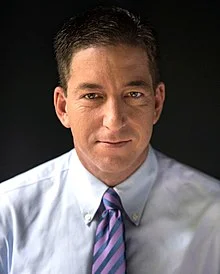
Glenn Greenwald
Glenn Greenwald, born on March 6, 1967, in New York, is a renowned journalist, author, and former attorney. He gained prominence for his work with The Guardian, where he played a pivotal role in reporting on the U.S. and U.K. global surveillance programs, using documents disclosed by whistleblower Edward Snowden. This reporting earned him the Pulitzer Prize for Public Service in 2014. Greenwald's career began in law, but he later shifted to journalism, co-founding The Intercept in 2014, an online news publication. He's known for his critique of mainstream media, advocacy for civil liberties, and skepticism of government surveillance. His journalistic approach often involves a meticulous analysis of government actions and policies, particularly those related to national security. A prolific writer, Greenwald has authored several best-selling books, including "No Place to Hide: Edward Snowden, the NSA, and the U.S. Surveillance State." His work continues to influence debates on privacy, freedom of speech, and the role of journalism in society.
Books Mentioned on The Jordan B Peterson Podcast #391 - Glenn Greenwald
The Jordan B Peterson Podcast #391 with Glenn Greenwald - A Discussion on Ideologies, Censorship, and Societal Trends
In episode #391 of The Jordan B Peterson Podcast, Jordan Peterson engages in a thought-provoking conversation with Glenn Greenwald, a journalist, author, and political commentator. They delve into various topics, including the war on misinformation, societal polarization, the role of religion, and the changing dynamics of politics and free speech.
War on Misinformation and Societal Polarization
Greenwald discusses the use of misinformation and disinformation in shaping societal narratives. He highlights how false moralism, safety concerns, and compassionate motives are often misused to create a binary worldview of good versus evil. This polarization is evident in various cultural and political contexts, including gender ideology and the actions of large corporations.
The Human Need for Metanarratives and Morality
Peterson and Greenwald explore the human necessity for overarching narratives and morality. They ponder the existence of God in a world that increasingly offers nihilism and totalitarianism as alternatives. The conversation touches on the idea of metanarratives as fundamental to understanding the basis of morality in society.
Greenwald’s Political Journey and Views
Greenwald reflects on his political journey, describing his evolution from being labeled as part of the American left to his current, more nuanced stance. He recounts his initial engagement in politics as a reaction to the war on terror and his subsequent critiques of both the Bush and Obama administrations. Greenwald emphasizes the importance of civil liberties and his skepticism of political labels.
The Role of Censorship in Modern Society
The dialogue shifts to the topic of censorship, with Greenwald expressing concerns about its increasing acceptance in Western societies. He argues that censorship is often justified by elites as necessary to combat perceived evils, thereby stifling dissent and promoting conformity.
Exploring the Roots of Religion and Spirituality
Peterson and Greenwald delve into the significance of religion and spirituality in human life. Greenwald shares his personal journey towards spirituality and the role it plays in his understanding of ethics and morality. They discuss the importance of having a spiritual or religious framework for a fulfilling life and the dangers of nihilism in a materialistic society.
Concluding Thoughts
The podcast concludes with a discussion on the potential dangers of a society where the law is disproportionately applied to protect the powerful and suppress the majority. Greenwald expresses his concerns about the growing divide between elites and the general populace, highlighting the need for societal structures that promote fairness and justice for all.
